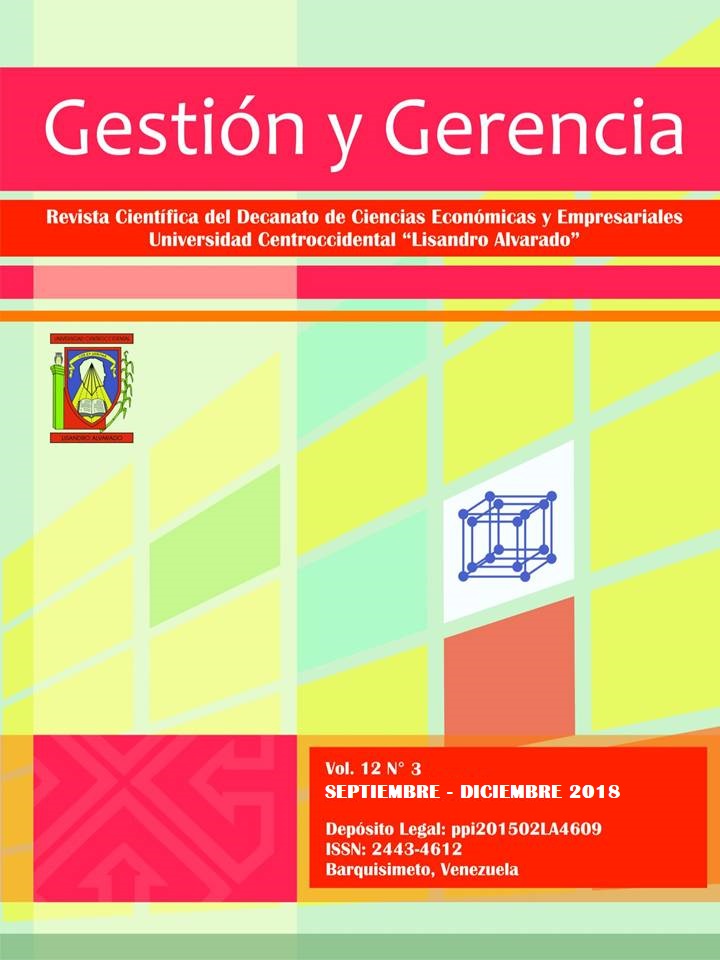A propriedade intelectual no desempenho econômico de Venezuela
Palavras-chave:
Propriedade Intelectual, marca, patente, OMPI, SAPI, IPRI, IPRResumo
Preservar os processos criativos e de invenção, promotores do desenvolvimento e a criatividade deverá ser reconhecida e respeitada, outorgando ao autor a proteção de seus direitos como proprietário, incentivo que promove a pesquisa, o progresso cultural, o avanço científico e o desenvolvimento tecnológico, que garante ao longo prazo avanços tecnológicos e um idôneo desenvolvimento socioeconómico. O objetivo é analisar o comportamento da Propriedade Intelectual em Venezuela dos registros de direitos de proteção nos últimos dez anos. A pesquisa é analítica com método dedutivo, de tipo não experimental, a técnica é a observação, tendo como instrumento de coleta, uma guia de observação estatística da Organização Mundial da Propriedade Intelectual (OMPI) e das estatísticas do Serviço Autónomo da Propriedade Intelectual (SAPI) nos anos 2007-2017. Conclui-se que o registro de marcas durante os dez anos evidencia a importância deste tipo de proteção para o desenvolvimento económico e cultural; preocupa o baixo número de registro de patente e a não outorga dos certificados de patente desde 2002 por quanto isto não incentiva o desenvolvimento de inventiva, fomenta a proteção fora do país e baixos indicadores tecnológicos nacional
Downloads
Referências
Congreso de la República de Venezuela (1993). Ley sobre el Derecho de Autor. Gaceta Oficial N° 4.638 Extraordinario. Caracas, 1 de octubre de 1993.
Esposito, C. de D. (1999). El Derecho de Autor en la Universidad Centroccidental Lisandro Alvarado (Trabajo de Ascenso). Universidad Centroccidental Lisandro Alvarado. Decanato de Administración y Contaduría, Barquisimeto, Venezuela.
Gurry, F. (2017). Informe del Director General a las Asambleas de la OMPI de 2017. [Informe Anual en línea]. Recuperado de http://www.wipo.int/edocs/pubdocs/es/wipo_pub_1050_2017.pdf
Instituto Nacional de Propiedad Industrial (2017). INAPI. Instituto Nacional de Propiedad Industrial de Chile. Recuperado de https://www.inapi.cl/
Naranjo, L. (2013). Historia de las Patentes. Protectia. [Artículo en línea]. Recuperado de http://www.protectia.eu/patentes/historia-de-las-patentes/
Organización Mundial de la Propiedad Intelectual (2017). OMPI. Organización Mundial de la Propiedad Intelectual. Recuperado de http://www.wipo.int/portal/es/
Organización Mundial de la Propiedad Intelectual (s/f). ¿Qué es la propiedad Intelectual? Publicación de la OMPI Nº 450 (S). [Revista en línea]. Recuperado de http://www.wipo.int/edocs/pubdocs/es/intproperty/450/wipo_pub_450.pdf
Pacheco, C. y Azuaje, G. (2015). Acceso a la información de Propiedad Intelectual en Venezuela. En Revista Gestión y Gerencia, Vol. 9 N°3, Septiembre- Diciembre , pp. 101-118.
Servicio Autónomo de la Propiedad Intelectual (2017). SAPI. Servicio Autónomo de la Propiedad Intelectual. Recuperado de http://sapi.gob.ve/
Servicio Autónomo de la Propiedad Intelectual (2017). Derecho de Autor Recuperado de http://sapi.gob.ve/?page_id=116
Servicio Autónomo de la Propiedad Intelectual (2017). Dibijo y Modelo Industrial Recuperado de http://sapi.gob.ve/?page_id=109
Servicio Autónomo de la Propiedad Intelectual (2017). Marcas y Distintivo Comercial Recuperado de http://sapi.gob.ve/?page_id=96
Uzcátegui, M. (1965). Invención y Patente de Invención en el Derecho Venezolano. Caracas, Venezuela: Casuz
Publicado
Como Citar
Edição
Seção

Este trabalho está licensiado sob uma licença Creative Commons Attribution-NonCommercial-ShareAlike 4.0 International License.
Derechos del/de autor/es a partir del año de publicación
Esta obra está bajo la licencia:
Creative Commons Reconocimiento-NoComercial-CompartirIgual 4.0 Internacional (CC BY-NC-SA 4.0)
Las opiniones expresadas por los autores no necesariamente reflejan la postura del editor de la publicación ni de la UCLA. Se autoriza la reproducción total o parcial de los textos aquí publicados, siempre y cuando se cite la fuente completa y la dirección electrónica de esta revista. Los autores(as) tienen el derecho de utilizar sus artículos para cualquier propósito siempre y cuando se realice sin fines de lucro. Los autores(as) pueden publicar en internet o cualquier otro medio la versión final aprobada de su trabajo, luego que esta ha sido publicada en esta revista.




